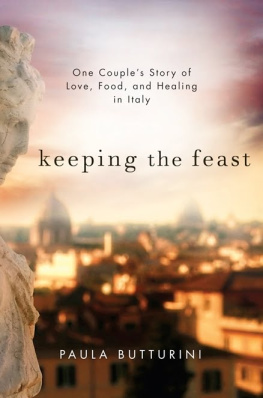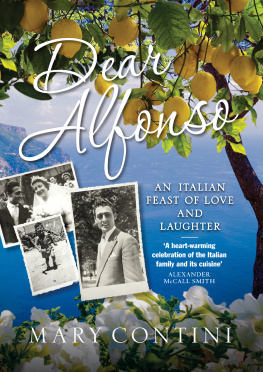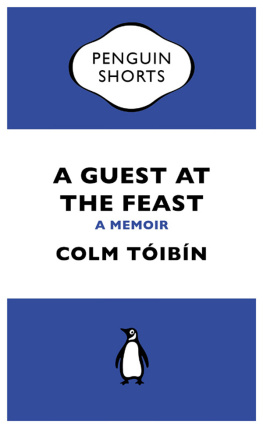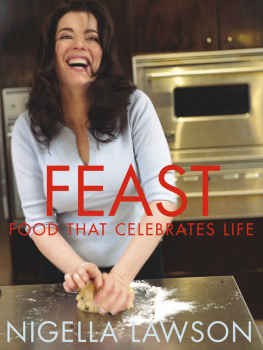Acknowledgments
This book had many midwives, both medical and literary. Profound thanks to: Harold Bourne, Flavia Donati, Veronique Durouchoux, Jacques Pieri, Henri-Paul Denis, Francis Slattery, Marianne Goldberger, Gary Lefer, Joan Prudick, Joshua Twersky, Krystyna Piotrowska, the late Petru Radulescu, Joseph Lelyveld, and to my father, brother, and late motherin various ways, healers all.
On the literary front, heartfelt thanks to: Francis X. Clines and Esther Fein, whose telex presence from Moscow to Munich helped launch this book years before I knew I had started writing it; the late Louis Inturrisi, who was there from the beginning; Katie Hafner, Cheryl Bentsen, John Marks, Debra Immergut, and the late Marilyn Koch, who soon joined in; and Jean Frere, Cathy Booth Thomas, Karen Wolman, Pat Remick, and Pauline Choi, who helped immeasurably near the finish. Very special thanks to Barbara Grossman, who counseled me not to write a cookbook, and to Sarah McGrath, who has an uncannily fine eye for addition and subtraction. Most important, deepest thanks to Charlotte Sheedy, whose chance acquaintance late in the process gave me the reason to pick up where I had left off.
Epilogue
Nearly a year after Julias birth, John had long mastered his fears about restarting fatherhood, and the two of them would giggle happily on the floor together whenever John was at home. Julia delighted more than anything in the antics of Little Man, an imaginary figure whose two legs were Johns index and middle finger. Little Man got into trouble constantly, jumping onto plates, bouncing onto peoples heads, falling into teacups and coffeepots, and Julia loved him most when his antics got completely out of hand and he had to be punished, forced repeatedly to sit on the edge of the dining room table, forbidden to make a peep.
Late in 1999, more than six years after we had returned to Rome, we moved to Paris. To move from southern Europe to northern Europe when its summer light is dying and the cool, pewter gray of winter is at hand was perhaps not the best idea for a family that had unknowingly become extremely attachedphysically and psychologicallyto Romes glorious and comforting southern light. Even Julia, who was at first excited at the thought of moving to the city of Madeline and twelve little girls in two straight lines, was rattled by our transfer. Shortly after we moved, she began balking at getting out of bed in the morning, no longer jumped into her clothes once she did get up, and cried whenever we left the apartment.
John, without psychiatric help for the first time in seven years, was happy to plunge into his new Paris assignment. He was happy to have left Italy, happy to be back in a more stimulating intellectual environment, happy to be brushing up on his French. The only things he, like Julia, seemed to miss were the light and warmth of Rome. The three of us, in fact, were all shocked by Pariss dirtiest little secret: that the weather in Paris is generally just a tad better than Londons, that the light of the City of Light is for many months of the year largely of the electric variety. I responded to the change in air and light by developing a three-year-long attack of chronic sinusitis that no amount of Western medicines could fight. It was not until, in despair, I consulted a Vietnamese acupuncturist and homeopathic doctor whose first treatment let me breathe normally again that I found I was slowly being taken in by Pariss considerable charms.
And then, by the time I was beginning to feel at home in France, in the fall of 2002, John began to flag. A routine prostate operation went off without a medical hitch but triggered flashbacks to his shooting and everything that followed. Over the course of the following year, despite a resumption of talk therapy, he slid, slowly at first, and then faster and faster, down the long, familiar slope of depression. Ultimately, after trying the new antidepression drugs on the market, to no avail, he agreed to our doctors urging of hospitalization and electroconvulsive therapy, a modern version of the treatment that had cured him for thirty years after he left the monastery. It was a year from diagnosis to recovery this time, but the experience was remarkably different because we knew what we were dealing with, and all of usme includedresponded much more aggressively.
Throughout the period of his slide, we followed the doctors advice and tried to keep our home life as unchanged as possible. Night after night, I would cook one of Johns favorite comfort foods for supperspaghetti with tomato, olive oil, garlic, and a handful of basil, or a risotto alla milanese yellow with saffron, butter, and Parmigiano; sauted veal scallops finished off with a touch of white wine and sage; a platter of tiny green beans or a green salad made of baby field greens. While I was throwing the meal together, for few of our favorite dishes took much time to cook, John and Julia would set the table together, correcting each other if either of them misplaced the silverware or glasses. Once the table was set, John usually disappeared into our bedroom or into his corner chair in the living room to sleep or pretend to sleep, to try his best not to cry, to at least close his eyes and mind to the world until the food was ready.
But once he heard my usual summons, A tavola, no matter how bad he felt, he knew he was expected to pull himself together and join Julia and me at the table, then eat, hungry or not, and at least listen to the conversation if not take part in it. During the meal Julia would tell us stories from the school-yard: which second-graders were demanding daily tributes; who hadnt done their homework; who had bled; who had cried; who had been mean or a comfort. Her stories and enthusiasms, like the simple meals I prepared, were a lifeline for each of us, keeping us afloat on those evenings when none of us could see any quick wayor any way at allout of our latest situation.
John was hospitalized for nearly five weeks, but at his insistence, the doctors allowed him to spend weekends at home, a dispensation that made him feel less ill and that allowed him to see Julia regularly, as children were not allowed to visit the psychiatric hospital just north of Paris where he was being treated. He received eight rounds of electroconvulsive therapy during his stay and was remarkably less depressed upon his release, although all of us were shaken by the loss of a portion of his short-term memory, basically everything that had happened in the three to four months before his hospitalization. Despite that memory loss, within three months he felt well enough to try returning to work part-time.
Julia, who was six at the Christmas when Johns depression descended again, was flummoxed by the change in her father, the smiling, cheerful daddy who would play with her endlessly when he got home from work. She seemed fairly fine during the course of the day, going off to school, playing with her friends. But the edges of the day were too much for her. Soon after John became ill, Julia began waking up sobbing each morning. But once she was up and dressed, once she had eaten, we would walk off to school happily, just as each afternoon we would walk home together in similar high spirits. Only as she climbed into bed would her mood swing around again, and she would lie there fretting, weeping, unable to fall asleep for hours. Julia had always had the gift of falling off to sleep in a matter of moments, without problems; now she was nervous, frightened, afraid of the dark, demanding to sleep with a light on, demanding that I read to her until she was so exhausted that she would practically pass out.
The responsibility of caring for Julia pushed me to act much faster for Johns recovery than I would have had Johns illness been affecting only him and me. Frightened by Julias reactions to Johns depression and understanding more and more that all of us were suffering from it, I sought help for both Julia and me early in his illness. It was an easy decision, for the one thing I knew more than anything was that I did not want my daughter growing up the way I had, knowing somehow that something was very wrong with one of her parents, but completely ignorant of what that something was. Our family doctor suggested a colleague in the neighborhood whom he described as excellent at family therapy. It was she who very quickly helped me find the right words to explain to Julia in a manner that a just-turned-seven-year-old could understand.










